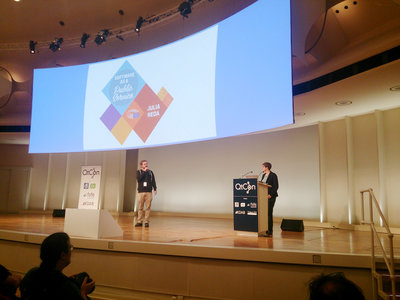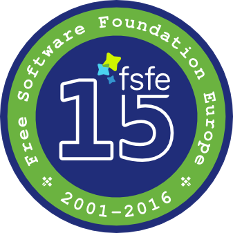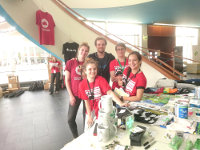FSFE Annual Report 2016
It has been a busy year for the FSFE. Upholding the principles of
Free Software and protecting citizens' from being exploited
are ongoing challenges we tackled from a variety of angles.
We (and by "we", we mean the staff and volunteers at the FSFE) pored
over hundreds of pages of policies and legislations, looking for loopholes
through which Free Software could be attacked.
We travelled to events all over Europe, often carrying with us dozens
of heavy boxes of merchandising, to explain what Free Software is all about
as speakers and attendees. We have organised our own events too including
our first international summit.

MEP Julia Reda speaks at the FSFE Summit
And we have dreamt up and executed campaigns to spread awareness of
the threats to Free Software and users' freedoms. This has entailed
mobilising dozens of staff members and volunteers, contacting the media,
and designing and ordering T-shirts, squishy stress balls/hearts, and balloons,
lots of balloons.
What follows are just a few of the highlights from 2016.
Help us to grow bigger and make a difference in 2017: https://fsfe.org/join
Policies and Legislation
Campaings
Events
Strengthening the Free Software Network
Coming up in 2017
TL;DR
Policies and Legislation
We have been carefully monitoring policies and legislation in Europe
and intervened when citizens' rights were in peril. We have formulated
several proposals to EU institutions and EU member states containing concrete
steps to solve the
issues with the EU Radio Directive.
This Directive threatens software
freedom with its ambiguous phrasing that all but forbids users from
installing unapproved software (read "Free operating systems") on
radio-enabled devices. These devices include all modern laptops, wireless
routers and every single smartphone in existence. Over 40 European
organisations and enterprises support our concerns and demands.Max Mehl
and Polina Malaja will be doing follow-up on this with along with our volunteers
and other organisations to make sure you can still install Free Software
on those devices.
Another threat to Free Software is the EC's stance on the Digital Single
Market strategy. We have patiently explained several times why FRAND licensing, the licensing
favoured by the Commission in its "ICT Standardisation Priorities for the
Digital Single Market", is incompatible with Free Software and why a more
liberal model should be used. This is still an ongoing battle.
Staying with the EC, we tried to help out on the "Free and Open Source
Security Audit" (FOSSA) project, commissioned jointly by the European
Parliament. The project should have helped evaluate the suitability of the
Free Software used in public administrations. A professional audit of Free
Software tools and frameworks would seem a good thing at first glance, an
excellent way to test run software and improve it when bugs and vulnerabilities
pop up. At the very least it would help protect citizens' data stored on
public servers.
However, after reading the results, it was not clear the time and
money invested into the study had been well-spent. The conclusions were
sometimes vague and some parts directly wrong. Despite our best efforts,
the company employed to do the survey did not seem to know much about
Free Software at all.
Join the FSFE to support our legal and policy work in 2017: https://fsfe.org/join
That said, the EC and MEPs in charge of the project, were always open
to our comments and able to push for improvements, although they were bound
to a contract with consultants who were not too knowledgeable about Free
Software matters. Viewed as a pilot, it helped everybody see where the
pitfalls were. With a bigger budget and the lessons learnt, the EU is
planning to follow our advice and improve the project in future iterations.
We even put the law to the test, and our colleague Max Mehl, the FSFE
coordinator for Germany, sent out "alternative" routers to testers so they could try them
with their Internet provider. We published the results on our Wiki to help others
who are thinking of changing their devices.
Campaigns

I Love Free Software Postcard
But not all our campaigns have been so serious. We have also carried
out a campaigns to raise awareness about Free Software amongst the general
public, and here "light-hearted" is literally the keyword. We launched
our 6th "I love FS" campaign on Valentine's day.
During this campaign, we encouraged all our friends to make a display of
love towards Free Software by telling the world, online with posts to
social media, or offline, with public demonstrations of FS love.
Online, we got tweets and blog posts from users, volunteers and
sympathizers explaining what they loved most about their favourite Free
Software project. Offline, we had at least one cake baked by the WikiMedia
Foundation, gifs of people squeezing our #ilovefs stress heart, and pictures
of people from all over Europe waving our "<3 Free Software"
balloons.
In a similar vein, we wanted to help the general media, local newspapers, radios
and TV stations, to know more about Free Software. To this end we started
our "Meet a Free Software Hero" campaign. Part of our larger 15th Anniversary
celebration campaign, we encouraged volunteers and media outlets to
get in touch with each other so that the "heroes" could explain
what software freedom was all about, and bust a few myths at the same time.
Thanks to the campaign, we managed to increase our profile with the
media and it has now become much more usual for journalists to get in touch
with us to comment on stories. This gives us more visibility and influence
to affect changes in favour of Free Software.

Events
Another way of reaching a wider audience was through events. Apart from
participating in Free Software-specific conferences like FOSDEM, LinuxCon
and different Linuxtage (we took the FSFE booth to all of these), we also
participated in the Wear Fair and more. This event
is Austria's largest textile fair for sustainable clothing and lifestyle,
and covers from organic food, to DIY electronic repairs. The themes of
sustainability, individual personal freedom and alternative economic
models helped our Foundation fit right in and we sold plenty of
T-shirts, bags and baby vests. We also collected contact information
of people interested in our cause.
But we are prouder of the two big events we organised ourselves. In April
we held our annual Legal and Licensing Workshop. This Workshop
is set up by and for members of the FSFE's Legal Network. Legal experts
from all sectors of the industry got together to discuss licenses, compliance
and what constitutes derivative work for three days in balmy Barcelona.
Speakers included Harald Welte of gpl-violations.org fame;
Miriam Ballhausen from JBB; and Eben Moglen, chairman of the Software
Freedom Law Center.
Our Legal Coordinator Polina Malaja together with our trainee Olga Gkotsopoulou
are already busy planning next years conference which we expect to be at
least as successful as 2016's.
Similarly exciting was our first ever FSFE Summit held in Berlin in September,
in which, Erik Albers, our community builder, commandeered a veritable
army of volunteers and interns to make sure that everything run smoothly.
Part celebration of FSFE's 15th anniversary, and everything we have achieved
over the years; part event to talk
about the non-technical aspects of Free Software, we covered the topics
of Free Software in business, the public sector and as a force for
social advancement in more than 50 talks. We also had our 15th
birthday party.
Speakers included, among many others, the two prior presidents and the
one current president of the FSFE, that is, Georg Greve, Karsten Gerloff,
and Matthias Kirschner; Sonia Montegiove and Italo Vignoli, the architects
behind the migration to LibreOffice of the Italian Armed Forces; and Roberto di Cosmo,
co-founder along with Stefano "Zach" Zacchiroli of SoftwareHeritage.org.
Julia Reda,
MEP for the Pirate Party, closed the event with a keynote on copyright
reform and made the case for Free Software on machines critical in
modern democracies. She explained, for example, why using inauditable
proprietary software on voting machines was unacceptable.

Booth at the FSFE Summit
Strengthening the Free Software Network
Which brings us to the subject of how we used events to make the network
of Free Software organisations stronger. The Software Heritage mentioned
above, for example, collects programs, applications and snippets of code
distributed under free license from several sources. It aims to preserve
an encyclopedia of free code for posterity. It was clear from the start
that the FSFE and SH had a lot in common, so we supported the initiative
early on, helping them get coverage in the media and offering them a platform
to spread the word about what they do.
We also strengthened our ties with the Document Foundation
by joining its Advisory Board. At the same time, The Document Foundation
became an associated organisation of the FSFE. This means that we will
be offering advice, support and suggestions on one of the most successful
Free Software projects out there: LibreOffice and all its ecosystem. With
the Document Foundation as an associated organisation, we created official
channels for the exchange of ideas, coordinate efforts, motivate each other,
and find opportunities to work together on specific projects.
Another thing we did was to hand over
the running of the FSFE's Document Freedom Day to Document Freedom Foundation. The DFD
already organises the Software Freedom Day (SFD) campaign, the Education
Freedom Day, and the Hardware Freedom Day. It seemed logical that they
also organise the Document Freedom Day. Like that they widened the range
of events of related events they offer, and it allows us to concentrate
on core Free Software topics.

FSFE Booth at 33C3
Coming up in 2017
But there is still a lot of work to do and 2017 is shaping up to be
an interesting year. Although we have managed to get the ban on compulsory
routers into law, we expect that ISPs will fight back, so we will have
to be on guard for that. The threat of FRAND licensing and software
patents is never far off and we will have to continue advising lawmakers
on why these are dangerous for Free Software and the European software
industry in general.Katharina Nucon, policy coordinator of the German
Pirate Party, will be helping us with this campaign.
Most of our efforts, however, will most likely be spent pushing for
getting more public institutions to publish their software under a free
license. We want public money to pay for public code, and only public code.
Software used by public institutions is acquired, deployed and/or developed
with taxpayers' money. Making it available under a Free license to all
citizens is just the right thing to do. Furthermore, we hope we will raise
awareness amongst politicians of the importance of using Free Software
when they see its advantages.
There are several important national and regional elections scheduled
throughout Europe in 2017. Politicians are supposedly more receptive during
campaigns, so we will do our best to make candidates and parties commit
to Free Software and openness in their administrations.
We need governments to commit to improving policies that favour Free
Software across the board. It is not admissible any more that the
administration pilfer taxpayers money on proprietary software.
We need policies that help the European IT sector become much more competitive
and sustainable. There is no better way to achieve this than incentivising
the use and development of Free Software and Open Standards.
Finally we need better policies to help promote Free Software amongst
the general public. Every European citizen must be allowed to regain
control over the technology they use once and for all.
TL;DR
This has been a long report, but if you need a summary, here goes:
Free Software improves everybody's life and the world. It is clear that
everybody have been handed
the short end of the IT stick for too long. SMEs need a level playing ground
to prosper and create employment. Private citizens and business owners must
be allowed to own and control the devices they pay for. Governments must be
at the service of the people, as must the software they pay for with people's
taxes. Free Software, Free Hardware and Open Standards solve all of the above.
All of these things should be self-evident, but apparently are not.
That is why we at the FSFE do what we do. Throughout this report we have
mentioned some of the people that work to turn these things into reality. However, and
it may sound cliché, but it doesn't make it less true, without the continued
support from you, the volunteer, the fellow, the occasional donor, and the moral
supporter, none of our staff would be able to do anything. We rely heavily on you,
your activities and your donations to stay independent and fight for your rights
when they are threatened, regardless as to where the threat comes from.
Please help us make next year's report is as long as this one, and do
consider joining the FSFE.
Best Regards,
Jonas Oberg (Executive Director) and Matthias Kirschner (President)
Support FSFE, join the Fellowship
Make a one time donation




